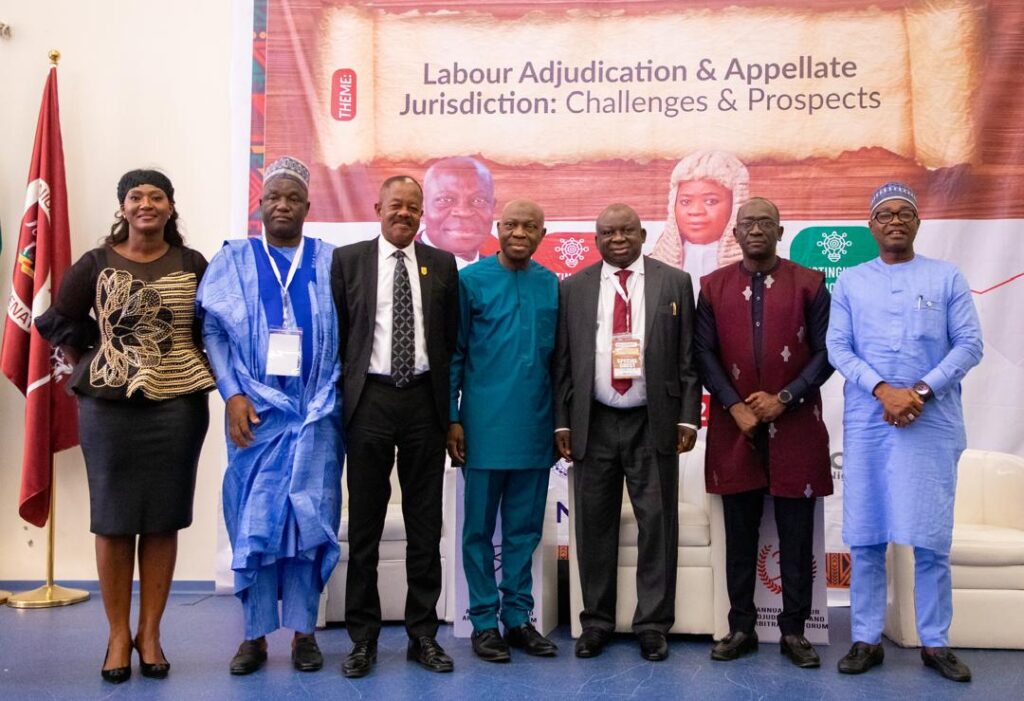
L-R Dr. Vanessa Phala-Moyo, Country Director of the ILO Office for Nigeria, Ghana, Liberia and Sierra Leone, Senator Diket Plang, Chairman , Senate Committee on Labour, Employment, and Productivity, Dr. Ifeanyi Okoye, Mni, OFR, President, NECA, HE Mr. Gilbert F. Houngbo, Director General, International Labour Organisation, Hon. Justice Benedict B. Kanyip, OFR President of the National Industrial Court of Nigeria, Mr. Adewale-Smatt Oyerinde, Director General, NECA and Mallam Ahmad Ladin Gobir, President, CIPM.
By Joan Nwagwu
The Nigeria Employers’ Consultative Association (NECA) and the International Labour Organisation (ILO) have called for a robust and efficient labour adjudication system in the country.
Dr Ifeanyi Okoye, NECA President and Mr Gilbert Houngbo, the ILO Director-General, respectively made the call at the 3rd Labour Adjudication and Arbitration Forum on Thursday in Abuja.
Speaking on the theme, “Labour Adjudication and Appellate:Challenges and Prospects”, the duo, respectively, contended that efficient labour adjudication system will ensure fair and timely resolution of employment disputes.
Specifically, Okoye said adjudication process is the foundation of industrial justice, ensuring that disputes between employers and employees are resolved with fairness and equity.”The appellate jurisdiction provides a necessary avenue for reviewing and refining judicial decisions, reinforcing trust in our legal framework.
“At NECA, we firmly believe that a well-structured and independent adjudication system is essential for industrial peace and economic growth.
“The ability of our courts and arbitration mechanisms to deliver swift, impartial, and fair decisions is key to building trust between employers and employees.
“It is our collective duty, as Social Partners, to ensure that these Institutions remain credible, effective, and adaptable to modern labour realities,” he said.
He further stressed the need for a strong appellate system in upholding justice and maintaining industrial harmony.
Okoye called for the quick passage of reviewed labour laws and the resuscitation of the National Labour Advisory Council.
He described the forum as “apt in strengthening Nigeria’s labour justice system” adding that the presence of stakeholders and social partners demonstrated the global significance of the discussions.
For his part, Houngbo said that labour conflict resolution is crucial in fostering economic growth and social stability.
He advocated for a shift from the concept of a minimum wage to a living wage, that can allow workers, afford their basic needs.
The ILO Director-General acknowledged the federal government’s efforts in raising the minimum wage from N30,000 to N70,000 while calling for policies centered on job creation and decent work.
According to him, “It is absolutely unacceptable that a citizen would be working 50 hours a week, 60 hours a week, across the world, not only in Nigeria, yet not being able to respond to the basic needs.
The Minister of Labour and Employment, Mt Muhammadu Dingyadi, reaffirmed the government’s commitment to ensuring harmonious labour relations through continuous dialogue.
Dingyadi commended the forum’s organisers for fostering discussions on education, dialogue, and dispute resolution.
He assured all, of the government’s readiness to address labour concerns including ongoing negotiations with JOHESU to prevent industrial actions.
“I want to assure Nigerians that, as a government under the leadership of our President, we are fully committed to listening to our workers, engaging with them, and working together as a team to achieve the economic development of our dear country.
“To achieve this, we must carry everyone along, foster mutual understanding, and reach agreements on all the issues before us,” he said.
Mrs Pamela Azinge. Chairman, Industrial Arbitration Panel (IAP)said that the theme was timely.and pertinent.
Azinge said the IAP recognised the importance of an efficient and equitable labour adjudication system in fostering industrial harmony which would stimulate economic growth, and ensure social stability within the nation.
“Labour adjudication serves as the cornerstone for resolving workplace disputes.
“It is a critical mechanism for upholding fairness, safeguarding workers’ rights, and maintaining a balanced and harmonious employer-employee relationship,” she said.
She advocated leveraging on technology to streamline case management, implementing online dispute resolution mechanism, and enhancing access to justice for all parties.
She also underscored the need for the implementation of robust programmes for the professional development of adjudicators and legal practitioners.